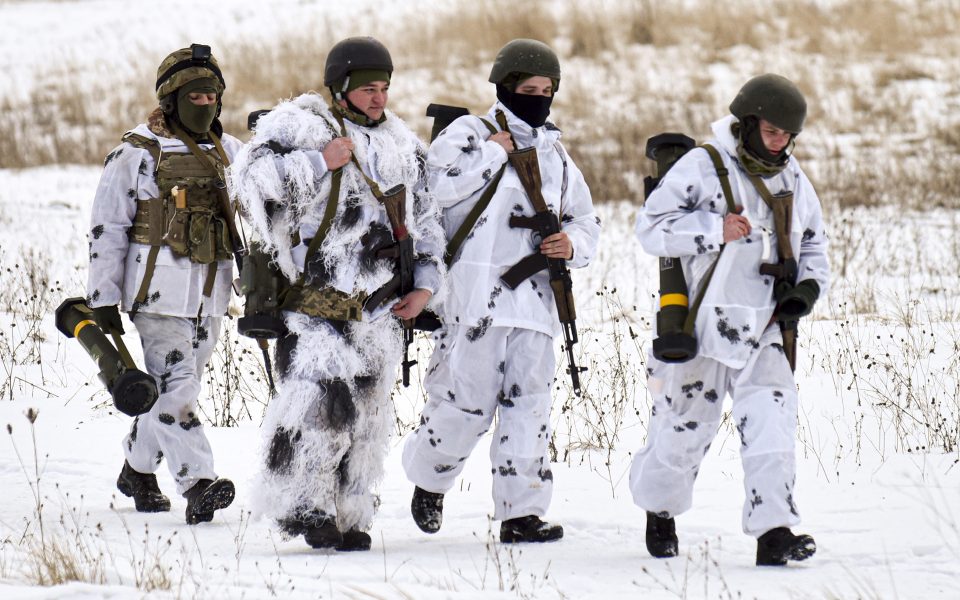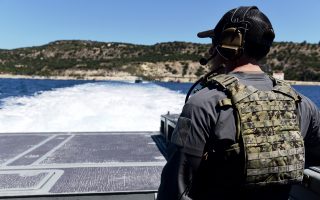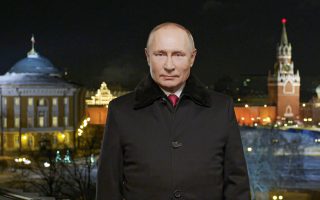Why Greece should be concerned about a war in Ukraine

We are, according to most analysts, a few weeks away from a Russian invasion of Ukraine, unless the West completely acquiesces to Vladimir Putin’s ultimatum – something very unlikely. A high-tech war will unavoidably have important, and perhaps historic, consequences globally. There are also many members of the Greek diaspora in the potential conflict zones. What is mainly at stake in this Ukrainian crisis is the solidarity and contribution framework of the West when faced with the use of violence in Europe. Viewed through such a lens, this could also indirectly create opportunities and pitfalls in Greco-Turkish relations. What do the ultimatums threatening violence by Putin and Recep Tayyip Erdogan have in common?
The widespread belief is that the Russian leader is not bluffing, with most disagreements focusing on the extent of his plans or the tools used to accomplish them. Russia’s strategic goal is deemed to be its international recognition as an equal partner in a new European security framework – in contrast to its former role as the defeated “pariah,” which the West thrust upon it after the end of the Cold War. The crisis seems to highlight the unwillingness or inability of the United States to deter, or even efficiently react to, the use of force – even if it is over a country outside the Alliance.
Ahead of a possible readjustment of the balance of power in Europe, Greece must be flexible in its moves and act with its own interests at heart. Up to now, subdued public discourse regarding our position on Ukraine and its possible ramifications point to a “wait and see” attitude. However, the circumstances call for immediate, “acrobatic” maneuvers, weaving between alliance obligations, European deterrence and traditionally important relations with Moscow. The most common analytical framework focuses on the role of the new American easements in Alexandroupoli, which while improving Greece’s image in the US have significantly irked Russia. What is really at stake for Greece is something else entirely. A country that consistently calls on the principles of solidarity and mutual defense must manifestly prove that it honors its obligations to other member-states of the European Union and NATO (which Ukraine is not).
At the same time, this situation has created the right conditions for the opportunity to set mutual support (primarily from the countries of Eastern Europe and Scandinavia) as a prerequisite against all threats by any aggressive neighbor. We must therefore utilize this rare confluence of events (in parallel with the Franco-Hellenic push for European strategic autonomy, the Strategic Compass, and others) to achieve one goal: an explicit and effective guarantee of mutual support against all forms of external attack. Security must be indivisible – for all member-states and running the entire length of the European Union’s external border. Any statement, contribution or sanction that we collectively shape now must, in this framework, be linked with equivalent solidarity in deterrence, sanctions and mutual defense vis-a-vis Turkey.
The most appropriate manifestation of our central stance on the matter could be a symbolic contribution, if asked, to aid Bulgaria. A wise show of solidarity could be through a mission to the Bulgarian coast by Hellenic Navy ships that will also be ready, if need be, to evacuate Ukraine’s Greek community by sea. If it comes to open conflict, the large Greek community in the region (100,000 to 200,000 people in the Donbas region and the coastal area of Mariupol) will most likely find itself in the crossfire.
Above all else, our overall approach must be to delve into the international precedents that will be created by an open conflict and the Western confrontation of armed invaders – irrespective of specific differences or national affinities. It is necessary to consider the worrying trend of Erdogan imitating the modus operandi of his Russian counterpart. Both leaders believe that the ongoing shift from a unipolar to a multipolar world is creating new opportunities for them. This is why they have heavily invested in their country’s military strength – especially against weaker states. After all, they both lean toward autocracy and treat the West as arrogant, “loud” and, ultimately, “soft.” They are certain that it will back down in the face of any threatening ultimatums and will avoid any military responses to an invasion, out of fear of human losses and the damage that will be done to Western economies (it is also useful here to include Europe’s reliance on energy from Russia and Turkey’s use of migratory flows as a threat).
Both feel that the confluence of events is favorable and believe that they can win big, with only a small risk. They knowingly put forward excessive demands, counting on the fact that a potential rejection of their demands paves the way for an armed invasion to suit their needs. The winner on the field of battle will fully impose his onerous terms. Their strategic goals are even more destabilizing. They want to restore their “empires” (Soviet Union/Ottoman), whose loss their predecessors were forced to accept. They are both impatient (with the threat of looming elections) to complete their perceived manifest destiny, they are both desperate for immediate “results.”
For Hellenism (Greece and Cyprus), Erdogan’s trend of imitating Putin adds a completely different dimension to the precedent created by the Ukrainian crisis, and one that should be considered at length. Despite their obvious differences, the similarity between the Russian method of sending ultimatums and that of Erdogan vis-a-vis Greece and the Republic of Cyprus are particularly worrying.
Every crisis by its very nature creates dangers, but also opportunities. It rewards those who take precautions and have a plan, and punishes those who rely on improvisation. By carefully drawing the right conclusions and acting with ambitious caution and precautionary planning, we will decisively promote our national interests.
Yannis Valinakis is a professor, president of the Jean Monnet European Center of Excellence the University of Athens and former deputy minister of foreign affairs.





